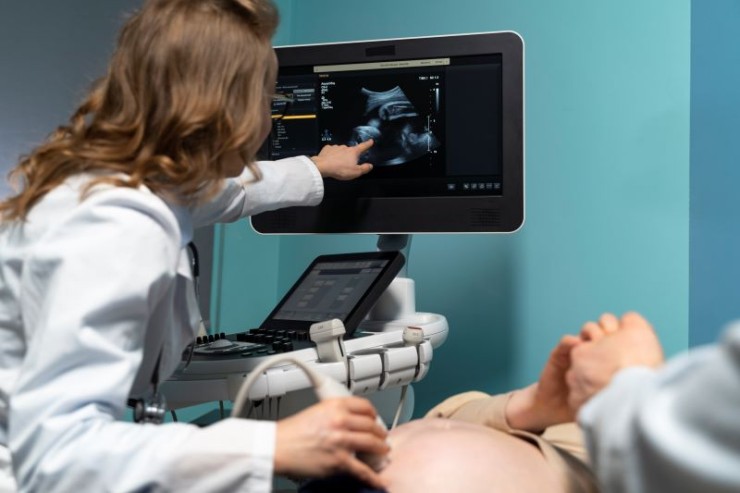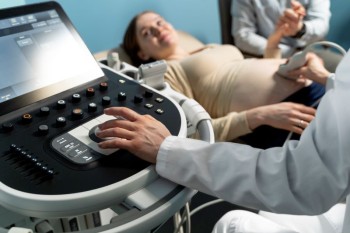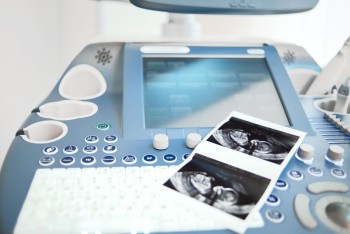
The NT Scan is a specialized ultrasound performed between 11 and 14 weeks of pregnancy. It focuses on measuring the nuchal translucency, a fluid-filled space at the back of the baby's neck.
Ultrasound / USG NT Scan in India with Cost
Ultrasound or USG NT
Scan in Detail: A Window into Fetal Well-being
The world of prenatal diagnostics welcomes a vital player: the Ultrasound or USG (Ultrasonography) NT (Nuchal Translucency) Scan. This comprehensive guide unravels the intricacies of the procedure, shedding light on its significance, procedure, and the valuable insights it offers into fetal health.
Introduction
Entering the realm of prenatal care, the Ultrasound or USG NT Scan takes center stage as a non-invasive diagnostic tool aimed at assessing fetal development and potential chromosomal abnormalities. This article aims to provide a detailed exploration of the procedure, offering insights into its purpose and importance.
Understanding USG NT Scan
The NT Scan is a specialized ultrasound performed between 11 and 14 weeks of pregnancy. It focuses on measuring the nuchal translucency, a fluid-filled space at the back of the baby's neck. This measurement, combined with maternal age and other factors, helps assess the risk of chromosomal conditions, particularly Down syndrome.
Importance in Prenatal Care
The USG NT Scan plays a pivotal role in identifying potential risks and ensuring the overall well-being of the developing fetus. Early detection of abnormalities allows healthcare providers to tailor care plans and offer support to expecting parents.
Preparation for the Scan
Preparation for the USG NT Scan is minimal. Pregnant individuals are typically advised to have a full bladder, enhancing the clarity of the ultrasound images. It is advisable to wear comfortable clothing for easy access to the abdominal area.
Procedure: A Glimpse into Fetal Anatomy
Ultrasound Gel Application: A clear gel is applied
to the abdomen, aiding the transmission of sound waves.
Transducer Movements: The transducer,
a handheld device, is gently moved over the abdominal area, emitting sound
waves that bounce back to create detailed images.
Nuchal Translucency Measurement: Special
attention is given to measuring the thickness of the fluid at the back of the
baby's neck.
Fetal Anatomy Assessment: Beyond the NT
measurement, the scan provides an opportunity to assess the overall fetal
anatomy.
Interpreting NT Measurement
A higher-than-average NT measurement may indicate an increased risk of chromosomal abnormalities. Combined with maternal age, blood tests, and other factors, it aids in calculating the overall risk assessment.
Benefits of USG NT Scan
Early Detection: The scan is performed in the first trimester,
allowing for early identification of potential issues.
Risk Assessment: It provides valuable information
for assessing the risk of chromosomal abnormalities.
Fetal Anatomy Evaluation: The scan offers
a preliminary evaluation of the fetal anatomy.
Risks and Considerations
USG NT Scan is generally considered safe, with minimal risks. However, it's crucial to discuss any concerns with the healthcare provider.
Emotional Aspects
The USG NT Scan can be an emotional experience for expectant parents. While it offers valuable information, it's essential to approach the results with an understanding of the screening nature of the procedure.
Expert Perspectives
Medical professionals emphasize the role of the USG NT Scan in early detection and risk assessment. Their insights contribute to informed decision-making and support for expecting parents.
Technological Advancements
Ongoing advancements in ultrasound technology contribute to the precision and clarity of images obtained during the USG NT Scan, enhancing its diagnostic capabilities.
Patient Experience
The USG NT Scan is generally well-tolerated by pregnant individuals. The procedure is quick, allowing parents to witness the early stages of their baby's development.
Conclusion
In conclusion, the Ultrasound or USG NT Scan emerges as a valuable tool in the realm of prenatal care, offering a glimpse into fetal health and aiding in early detection. As technology advances and our understanding deepens, this procedure continues to play a crucial role in ensuring the well-being of both expectant parents and their unborn children.
FAQs: Demystifying Common Concerns about USG NT Scan
1. Is the USG NT Scan mandatory for all pregnant individuals?
No, the USG NT Scan is not mandatory. It is an optional screening tool that pregnant individuals can choose based on their preferences and risk factors.
2. Can the NT Scan definitively diagnose chromosomal abnormalities?
No, the USG NT Scan provides a risk assessment for chromosomal abnormalities, particularly Down syndrome. It cannot definitively diagnose these conditions; rather, it identifies individuals at higher risk who may need further diagnostic tests.
3. Does a high NT measurement guarantee a chromosomal abnormality?
No, a high Nuchal Translucency (NT) measurement indicates an increased risk, but it does not guarantee the presence of a chromosomal abnormality. Further diagnostic tests, such as chorionic villus sampling (CVS) or amniocentesis, are typically recommended for a more accurate diagnosis.
4. Are there any risks to the fetus during the NT Scan?
The USG NT Scan is generally considered safe, with minimal risks to the fetus. It is a non-invasive procedure that uses sound waves to create images, posing no known harm to the developing baby.
5. What happens if the NT Scan indicates an increased risk?
If the USG NT Scan suggests an increased risk of chromosomal abnormalities, healthcare providers may recommend additional tests for a more accurate diagnosis. These tests may include chorionic villus sampling (CVS) or amniocentesis, which can provide more conclusive results.
6. Can the NT Scan detect all types of chromosomal abnormalities?
While the NT Scan is effective in identifying common chromosomal abnormalities, it may not detect all types. Some genetic conditions may require additional specialized testing for confirmation.
7. When is the ideal time to undergo the NT Scan?
The NT Scan is typically performed between 11 and 14 weeks of pregnancy. This timeframe allows for accurate measurement of the nuchal translucency and assessment of fetal development.
8. How long does the NT Scan procedure take?
The NT Scan is a relatively quick procedure, usually lasting around 20 to 30 minutes. The actual scan time may vary based on factors such as fetal position and cooperation.
9. Are there any specific preparations required before the NT Scan?
Pregnant individuals are often advised to have a full bladder for optimal visualization during the scan. It's advisable to wear comfortable clothing, and discussing any concerns or medical history with the healthcare provider beforehand is beneficial.
10. Can the NT Scan be performed if I have a multiple pregnancy (twins, triplets, etc.)?
Yes, the NT Scan can be performed in multiple pregnancies. However, the interpretation of results may be different, and healthcare providers will consider the unique aspects of each fetus.
11. What if I choose not to undergo the NT Scan?
The decision to undergo the NT Scan is a personal one. If an individual opts not to have the scan, alternative screening and diagnostic options can be discussed with healthcare providers to ensure comprehensive prenatal care.
12. Does insurance typically cover the cost of the NT Scan?
Insurance coverage for the NT Scan may vary. It's advisable to check with the insurance provider to understand the extent of coverage and any potential out-of-pocket costs.
13. Can the NT Scan identify structural abnormalities in addition to chromosomal issues?
While the primary focus of the NT Scan is on measuring nuchal translucency and assessing chromosomal risk, it can also provide a preliminary evaluation of overall fetal anatomy.
14. Are there any restrictions or limitations on activities after the NT Scan?
Generally, there are no specific restrictions on activities after the NT Scan. Pregnant individuals can resume normal activities immediately.
15. How often is the NT Scan recommended during pregnancy?
The NT Scan is typically a one-time screening performed in the first trimester. Additional scans may be recommended based on individual circumstances or if further assessments are needed.
These FAQs aim to address common concerns and provide clarity on the purpose, limitations, and implications of the USG NT Scan in prenatal care. It's essential for expecting parents to discuss any questions or apprehensions with their healthcare providers for personalized guidance and support.
(0)
Login to continue



